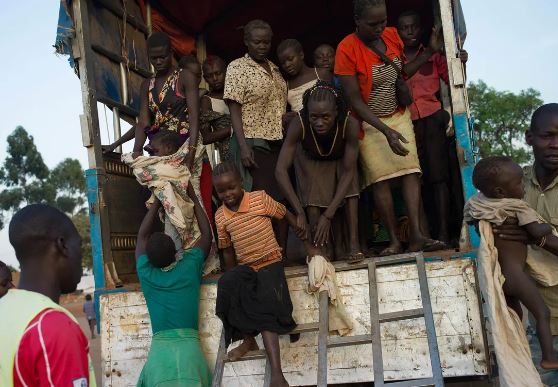
 South Sudanese refugee families disembark a bus./SCREENGRAB
South Sudanese refugee families disembark a bus./SCREENGRAB
The question on every citizen’s lips remains urgent: Which way, South Sudan? South Sudan’s economy, overwhelmingly dependent on oil revenues, has been dealt a severe blow.
The conflict in Sudan since 2023 disrupted the vital oil pipeline that transports crude to Port Sudan, culminating in a 2024 shutdown that triggered an economic meltdown.
GDP plummeted, inflation soared beyond 100 per cent and the South Sudanese Pound depreciated sharply. With dwindling revenues, the government struggled to pay salaries and maintain essential services, deepening public discontent and fuelling fears of renewed instability.
Although some oil exports have resumed, the economy remains on precarious ground; exposed to both external shocks and internal governance weaknesses.
The 2018 Revitalised Peace Agreement, once hailed as a turning point, has been hamstrung by delays and half-hearted implementation.
Security reforms, cantonment of forces, constitutional review, and electoral preparations have either stalled or been postponed indefinitely.
Internal rivalries, political mistrust, and vested interests have eroded the spirit of the agreement, leaving civilians trapped in a limbo of uncertainty.
As peace milestones slip by unmet, the risk of a return to open con ict looms ever larger on the horizon.
The presence of armed holdout groups; including the National Salvation Front and splinter militias like the White Army; continues to destabilise regions across the country. These factions, refusing to sign the peace accord, have engaged in sporadic attacks against government forces, civilians, and even humanitarian missions.
Their operations have fuelled insecurity, displaced communities and undermined local governance structures.
Despite government overtures for dialogue, the holdout groups remain entrenched, posing a persistent threat to national unity and peacebuilding efforts.
International sanctions and the UN arms embargo, intended to pressure South Sudanese leaders toward peace, have had mixed results. While they have curtailed arms inflows, they have also constrained the government’s ability to implement critical security reforms.
Moreover, financial sanctions have hampered economic recovery efforts, limited access to international markets and discouraged investment.
South Sudanese officials argue that while the sanctions are aimed at fostering accountability, they inadvertently stifle the very reforms they are meant to encourage. A more calibrated approach, linking sanctions relief to measurable progress, is urgently needed.
South Sudan’s diplomatic relations are increasingly strained. Tensions with Sudan over oil transit fees and border security have been exacerbated by the ongoing con ict in Sudan itself, posing both economic and political risks for Juba.
Relations with Western nations have soured due to alleged human rights abuses, governance failures and the slow pace of reforms. Sanctions, visa bans and reduced donor funding have followed.
On the global stage, South Sudan finds itself under heightened scrutiny, often on the defensive in international forums. For South Sudan to move forward, the following should happen: One, fast-track full implementation of the Peace Agreement. Commit to clear, realistic timelines for security reforms, constitutional processes and democratic elections.
Engage holdout groups through credible dialogue and trusted mediators. Two, strengthen economic resilience beyond oil. Diversify the economy by investing in agriculture, infrastructure, and small enterprises.
Ensure transparent management of oil revenues to rebuild trust and encourage investment. Three, reform security and integrate armed groups.
Implement robust disarmament, demobilisation, and reintegration programmes. Support community-based security initiatives to prevent local conflicts. Four, engage regional and international partners constructively.
Pursue diplomatic engagement to review sanctions in line with peace progress. Rebuild ties with Sudan and regional partners for mutual economic and security cooperation.
Five, promote good governance and accountability. Strengthen anti-corruption frameworks and promote transparent governance.
Protect human rights and civic space to lay the groundwork for South Sudan stands on the edge of a defining moment in its history.
The decisions made today; by leaders, citizens, and international partners, will determine whether the country remains trapped in a cycle of conflict or charts a new path toward peace, stability, and prosperity.
Kirangacha Mwaniki Political lobbyist












